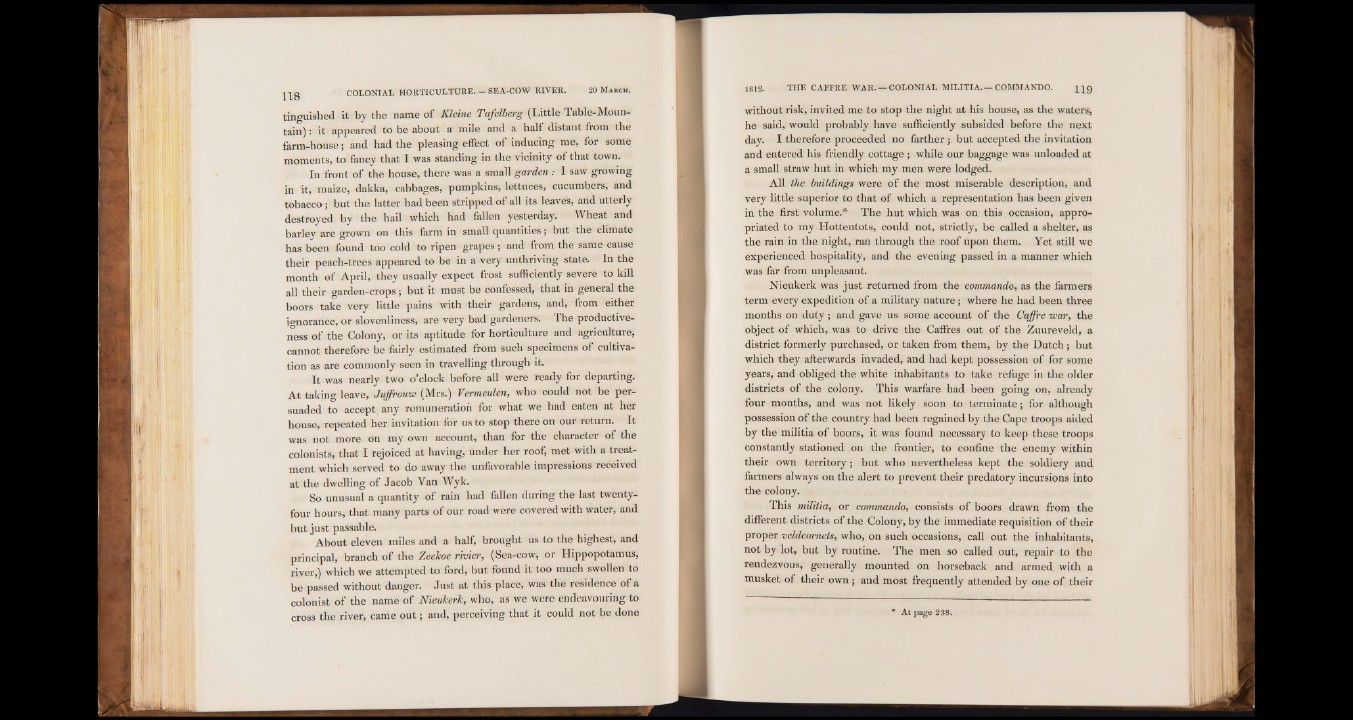
tinguished it by the name of Kleine Tafelberg (Little Table-Moun-
ta in )it appeared to be about a mile and a halt distant from the
farm-house; and had the pleasing effect of inducing me, for some
moments, to fancy that I was standing in the vicinity of that town.
In front of the house, there was a small garden : I saw growing
in it, maize, dakka, cabbages, pumpkins, lettuces, cucumbers, and
tobacco ; but the latter had been stripped of all its leaves, and utterly
destroyed by the hail which had fallen yesterday. Wheat and
barley are grown on this farm in small quantities; but the climate
has been found too cold to ripen grapes; and from the same cause
their peach-trees appeared to be in a very unthriving state. In the
month of April, they usually expect frost sufficiently severe to kill
all their garden-crops; but it must be confessed, that in general the
boors take very little pains with their gardens, and, from either
ignorance, or slovenliness, are very bad gardeners. The productiveness
of the Colony, or its aptitude for horticulture and agriculture,
cannot therefore be fairly estimated from such specimens of cultivation
as are commonly seen in travelling through it.
It was nearly two o’clock before all were ready for departing.
At taking leave, Juffrouw (Mrs.) Vermeulen, who could not be persuaded
to accept any remuneration for what we had eaten at her
house, repeated her invitation for us to stop there on our return. It
was not more on my own account, than for the character of the
colonists, that I rejoiced at having, under her roof, met with a treatment
which served to do away the unfavorable impressions received
at the dwelling of Jacob Van Wyk.
So unusual a quantity of rain had fallen during the last twenty-
four hours, that many parts of our road were covered with water, and
but just passable.
About eleven miles and a half, brought us to the highest, and
principal, branch of the Zeekoe rimer, (Sea-cow, or Hippopotamus,
river,) which we attempted to ford, but found it too much swollen to
be passed without danger. Just at this place, was the residence of a
colonist of the name of Nieukerk, who, as we were endeavouring to
cross the river, came out; and, perceiving that it could not be done
without risk, invited me to stop the night at his house, as the waters,
he said, would probably have sufficiently subsided before the next
day. I therefore proceeded no farther ; but accepted the invitation
and entered his friendly cottage ; while our baggage was unloaded at
a small straw hut in which my men were lodged.
All the buildings were of the most miserable description, and
very little superior to that of which a representation has been given
in the first volume.* The hut which was on this occasion, appropriated
to my Hottentots, could not, strictly, be called a shelter, as
the rain in the night, ran through the roof upon them. Yet still we
experienced hospitality, and the evening passed in a manner which
was far from unpleasant.
Nieukerk was just returned from the commando, as the farmers
term every expedition of a military nature; where he had been three
months on duty; and gave us some account of the Caffre war, the
object of which, was to drive the Caffres out of the Zuureveld, a
district formerly purchased, or taken from them, by the Dutch; but
which they afterwards invaded, and had kept possession of for some
years, and obliged the white inhabitants to take refuge in the older
districts of the colony. This warfare had been going on, already
four months, and was not likely soon to terminate; for although
possession of the country had been regained by the Cape troops aided
by the militia of boors, it was found necessary to keep these troops
constantly stationed on the frontier, to confine the enemy within
their own territory; but who nevertheless kept the soldiery and
farmers always on the alert to prevent their predatory incursions into
the colony.
This militia, or commando, consists of boors drawn from the
different districts of the Colony, by the immediate requisition of their
proper veldcomets, who, on such occasions, call out the inhabitants,
not by lot, but by routine. The men so called out, repair to the
rendezvous, generally mounted on horseback and armed with a
musket of their own; and most frequently attended by one of their